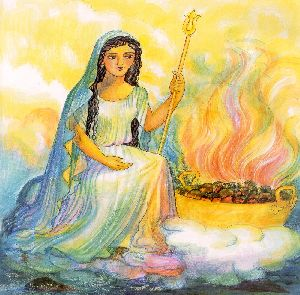
by Summer Fey-Wülf

| Hestia | |
|---|---|
|
Goddess of the Hearth
|
|
| Abode | |
| Symbol | |
| Parents | |
| Siblings | |
| Roman equivalent | |
In Greek mythology Hestia (Roman Vesta), daughter of Cronus and Rhea (Ancient Greek Ἑστία, "hearth" or "fireside"), is the virgin goddess of the hearth, architecture, and of the right ordering of domesticity and the family. She received the first offering at every sacrifice in the household. In the public domain, the hearth of the prytaneum functioned as her official sanctuary. With the establishment of a new colony, flame from Hestia's public hearth in the mother city would be carried to the new settlement. She sat on a plain wooden throne with a white woolen cushion and did not trouble to choose an emblem for herself.[1]
In Roman mythology, her more specifically civic approximate equivalent was Vesta, who personified the public hearth, and whose cult of the ever-burning hearth bound Romans together in the form of an extended family. The similarity of names between Hestia and Vesta, is misleading: "The relationship hestia-histie-Vesta cannot be explained in terms of Indo-European linguistics; borrowings from a third language must also be involved," scholar Walter Burkert has written.[2] At some primitive level her name means "home and hearth", the oikos, the household and its inhabitants. "An early form of the temple is the hearth house; the early temples at Dreros and Prinias on Crete are of this type as indeed is the temple of Apollo at Delphi which always had its inner hestia"[3] Among classical Greeks the altar was always in the open air with no roof but the sky, and that of the oracle at Delphi was the shrine of the Goddess before it was assumed by Apollo. The Mycenaean great hall, such as the hall of Odysseus at Ithaca was a megaron, with a central hearth fire.
The hearth fire of a Greek or a Roman household was not allowed to go out, unless it was ritually extinguished and ritually renewed, accompanied by impressive rituals of completion, purification and renewal. Compare the rituals and connotations of an eternal flame and of sanctuary lamps. At the more developed level of the polis, Hestia symbolizes the alliance between the colonies and their mother cities.
My personal first encounter with Lady Hestia happened at a truck stop in Lebanon Junction, Kentucky. I was an over-the-road trucker. It was about 5:00 p.m. and I had shut down for the night. I don't remember the exact date, but it was when I was trying to decide what kind of house I would someday build on my property, probably in 1994. Lady Hestia instructed me to pick up my clipboard, pencil, and straight-edge. She then proceeded to give me the design and layout for my house. I could never design a floor-plan for a house on my own. She directed my hands to put on paper the design of my home in which I now live. She further provided the money to build it in 1995, after I got hurt and couldn't drive anymore. It's not finished yet, but I know it will be...because Lady Hestia is still very present in my life and in this house, as She will always be.
Ritual to Lady Hestia
Cast the Circle and face East. Call the Elements and Lady Hestia to join in.
~Summer Fey-Wülf